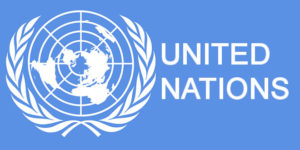 A TEMPORARY ‘EMERGENCY’ U. N. REGIME MAY RULE PALESTINE WHEN BRITISH LEAVE
A TEMPORARY ‘EMERGENCY’ U. N. REGIME MAY RULE PALESTINE WHEN BRITISH LEAVE
Click here to view the original article.
NEW YORK, May 5 (AP)-An emergency United Nations regime to rule Palestine appeared tonight to be the temporary U. N. answer to the Holy Land problem.
The first glimmer of what the 58-nation assembly might do to meet the immediate crisis in Palestine emerged from two closed sessions of a 12-nation group at the French delegation offices.
The assembly’s political committee-in effect the assembly itself-asked this subcommittee yesterday to go over the whole complicated issue and try to find a solution before Britain ends her mandate over Palestine on May 15.
Cuba called for a plebiscite it Jews and Arabs cannot agree on a final solution.
It was emphasized that the suggested emergency administration would not be a U. N. trusteeship, advocated by the United States, nor a permanent answer to the Arab-Jewish deadlock.
Based on comments by subcommittee members, the situation now appeared to stand this way-
1-The delegates recognize that no final solution for the Palestine problem can be found at present. There are not enough votes to reaffirm the U. N. partition scheme approved last November 29 or overthrow it.
2-An emergency regime should not modify or change the present situation in Palestine, where the Jews have in effect partitioned their own new country and are ready to proclaim it to the world.
3-The U. N. Assembly should recommend that no U. N. member recognize any country set up in Palestine during the temporary regime.
4-The Arabs and Jews might be more likely to approve an emergency regime than any other type of U. N. intervention in Palestine.
(United Press reported the Russian Ambassador to the United States, A. S. Panyushkin, objected strenuously to the U. N. retaining authority under such a regime, arguing that that the U. N. now was committed to the partition plan under which separate Jewish and Arab states would be created.)
The subcommittee will meet again Friday.
The delegates will be busy at an Assembly meeting tomorrow and at a Security Council session in which Palestine’s civil war is expected to be aired.
The Jewish Agency for Palestine submitted to Alexander Parodi, French delegate chief and council president for May, a long list of reported aggressions by the Arabs against Jews and urged the council to expedite action to stop them.
Some delegates speculated that the plebiscite suggested by Cuba could be held by the emergency regime after peace had been restored. The plebiscite was suggested by Guillermo Belt, Cuban Ambassador to the United States.
Belt, who voted last November against the U. N. scheme to partition Palestine, told the subcommittee it should find a way to set up a provisional regime for Palestine before May 15. Britain has declared she will relinquish her mandate over the Holy Land on that date.
This regime, he said, should restore order. It should call on Arabs and Jews to agree on a “free, independent state in Palestine.”
If the Jews and Arabs do not agree, within a time limit not yet fixed, Belt added, the U. N. regime should hold a plebiscite.
The idea of a single independent country in Palestine has been advanced by the Arabs but has received little support among the delegates. The Jews have announced plans to proclaim a Jewish nation when the mandate ends.
(According to United Press, the Palestine Commission announced at Lake Success that it had reached agreement with the Chamber of Shipping for the big port of Haifa for handling mail in and out of Palestine. Mail service has practically disappeared in the last weeks. Under this plan, the chamber would bring in the mail and turn it over to Jewish and Arab authorities for distribution.
It was becoming increasingly evident, United Press said, that Great Britain is calling the turn, inside the United Nations and out, on the kind of authority which will succeed her mandate in Palestine when her troops leave.
Although the U. N. was struggling to reach some solution to the Palestine problem on grounds that British responsibility will end 10 days hence, the vague outlines of what actually is going to happen were beginning to emerge.
(Among the probable developments-
(1-An “emergency Mayor” will be named by the British High Commissioner to take over supervision of municipal functions in Jerusalem-electricity, water supply, transportation, the fire department. The U. N.’s Trusteeship Council will recommend that course, thought up by the British, to a general session of the United Nations Assembly tomorrow morning.
(2-Some “neutral authority” will be sent to Palestine by the U. N. to leave the world organization at least a foothold in the Holy Land. That is another British idea and this “neutral authority” may well be a Briton. The United States gave evidence today that it was shoving its coldly received trusteeship plan into the background to support the British idea of retaining at least a “thread of legality” for the U. N. in Palestine.)
The U. N. called a meeting of the entire Assembly for 10 a. m. (EST) tomorrow at Flushing Meadow to consider recommendations from the Trusteeship Council for safeguarding Jerusalem.